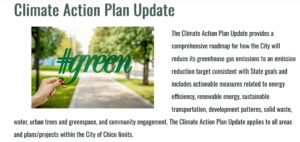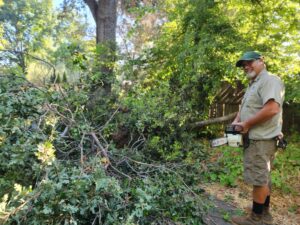by Natalie Hanson
posted Aug. 13
Butte County, facing the Camp Fire, the Dixie Fire, the Park Fire and extreme heat, has been on the frontlines of climate change in recent years. But the City of Chico has not made policies reflecting the urgency of these crises, some say.

Chico’s Climate Action Commission’s role has over time been cut dramatically, and the plans staff put together over years to help plan for a future of climate change have not been properly implemented, say some Chico residents. In their view, a lack of planning for climate change is symptomatic of the City’s unwillingness to make climate change the focus of policy or even fund the work to do so.
Community Development Director Brendan Vieg disagrees with this view, pointing to progress on plans like the Urban Forest Master Plan. “Combatting climate change provides an opportunity to build a healthy, equitable and resilient community,” Vieg states on the Climate Action Plan update (CAP) website page.
Climate Action Commission chair a critic
Climate Action Commission Chair Brian Scott Kress said that he doesn’t think the City’s strategies, as they stand today, properly incorporate an understanding of how to mitigate climate change or that the City prioritizes his panel’s work. “Our policies and approach to governing should reflect the immediacy of these challenges,” Kress said.
The Commission helped craft the CAP, which was completed in 2018 and updated in 2020. It contains measures to ensure the City meets the state goal of a 40% reduction in greenhouse gasses by 2030 and eliminates them by 2045.

While the City’s master plans for managing its urban forest, wildland vegetation and heat risks acknowledge climate’s role in past wildfires, the plans don’t contain a strong connection with climate change as a cause, Kress said. He finds that alarming because Chico is required to align with state targets for reducing greenhouse gas emissions to get certain kinds of state funding. Those funds cannot only help lower energy bills, improve transportation networks and electrify homes and businesses, but aid in mitigating dire climate consequences already underway in the region, Kress said.
“We should be adamant about integrating a climate lens into our actions – the consequences of inaction are already here,” Kress added. “Chico has the responsibility to become a model for resilience and proactive climate action, demonstrating effective strategies that can be replicated across the region, if not the country.”
The City Council changed the Commission from holding standing monthly meetings to meeting “as needed” in November 2023. City staff last called the Commission to meet in April with a limited agenda. Fewer meetings have limited the Commission’s ability to guide efforts to address climate change and keep the City on target to accomplish the CAP goals, he said.
Kress is a founder and principal at a Chico venture studio called Dayani that designs digital services to address climate change. He worries that many local elected officials do not discuss climate change or propose ways to address it within official strategies. The City Council has a lot of influence, as those elected leaders set the priorities and direction for staff.
“When we see local climate action, vulnerability, and scenario planning largely missing from crucial plans like our wildfire mitigation strategy, it’s clear that those plans are leaving our community members vulnerable to climate risks,” Kress said. “We need all our city leaders to be vocal, clear-eyed, and proactive about climate action.”
City official disagrees
Vieg, though, vouched for his team, noting that staff work hard to incorporate the Commission’s work — with consideration of the changing climate — into master plans.

Vieg said the City followed the CAP’s recommendation to implement an Urban Forest Master Plan to maintain a healthy urban forest for the next 40 years. The plan includes work to add to the City’s forest canopy, manage open spaces and natural resources and keep a public tree inventory. He also noted that the City’s Fire Department developed a Community Wildfire Protection Plan in 2022 to “assess wildfire threats, community preparedness, defensibility, and potential hazard mitigation measures.”
The City’s 2018 Climate Change Vulnerability Assessment contains lots of information about extreme heat and increased wildfire risks, and cites Bidwell Park’s woodland and savanna ecosystems as being most at risk of suffering the effects of climate change.

“Many of these areas are biologically rich in species and can be easily be disturbed by changes in the number of extreme heat days, heat waves, and overall increased temperatures,” according to the assessment.
Stemen: Climate not a City focus
However, Chico State professor of geology and environmental studies Mark Stemen says that mentioning climate change in City plans is not as effective as making it the focus of official policy.
Stemen has spent a lot of time with City staff to craft official plans. But he told ChicoSol that he’s worried that City leaders don’t take climate change seriously enough to use those plans to proactively handle the impacts of drought and extreme heat on the city and parks.

Stemen formerly sat on the Climate Action Commission. He said that since the pandemic began, the City has not financially supported efforts to reach stated climate goals. The City also hasn’t been completing reports on efforts to reduce greenhouse gas emissions, despite being required to do so under its CAP procedures. And the parks division does not file reports on any efforts to sequester carbon in its plans for managing public lands, he added.
Stemen said these problems point to an unwillingness to make climate change the center issue around which strategies revolve. For example, he said that Chico and Butte County officials do not name conditions arising from climate change — including hotter, longer, drier summers — as the real driver of catastrophic fires. The City hasn’t touched the Commission’s plan to handle extreme heat due to climate change, which has sat in Internal Affairs since 2021, he said.
Stemen also said the City has not made enough movement toward transitioning from fossil fuels and planning around vehicles and taking action on cutting greenhouse gas emissions.
“It’s easier to blame someone else than admit we’re the ones that are doing it,” Stemen said, referring to human-induced climate change.
Progress at the County
There’s some progress on the way, as Butte County this month announced that it will partner with a Rocklin firm to restart its own Community Choice Aggregation (CCA). The CCA is a program that allows cities, counties and other qualifying governmental entities to purchase and/or generate electricity for residents and businesses, Stemen said. (Chico hasn’t been sending its representative to the county’s CCA meetings, he said.)
That countywide effort will be crucial to stop taking a reactive approach to climate crises, and instead start learning from other cities’ work.
The City’s Climate Action Commission took notes from the city of Albany, Calif.’s work on issues like carbon sequestration, Stemen said. There’s no reason why the City can’t do as well, if not better, he added.
Although discussions locally in recent weeks have revolved around controlled burns as a method of wildfire prevention, efforts to address climate change require many types of proactive work, Stemen said. “We can’t just control burn our way out of climate change,” he added.
Natalie Hanson is a contributing editor to ChicoSol.

First, if the Climate Action Commission was truly meeting “as needed” it would be meeting practically everyday. Second, the Urban Forest Master Management Plan was watered down so much by the present City Council (except for Addison Winslow) that it’s hardly worth talking about, let alone counting on it to help with our climate goals. Third, the Community Choice Aggregation is an excellent idea, however, I went to the first, and as far as I know only, public meeting about it presented by the city about 10 years ago. Alas, nothing has happened since. Lastly, I agree with what Mr. Kress says. The City’s lack of action regarding our climate crisis is alarming, to say the least.